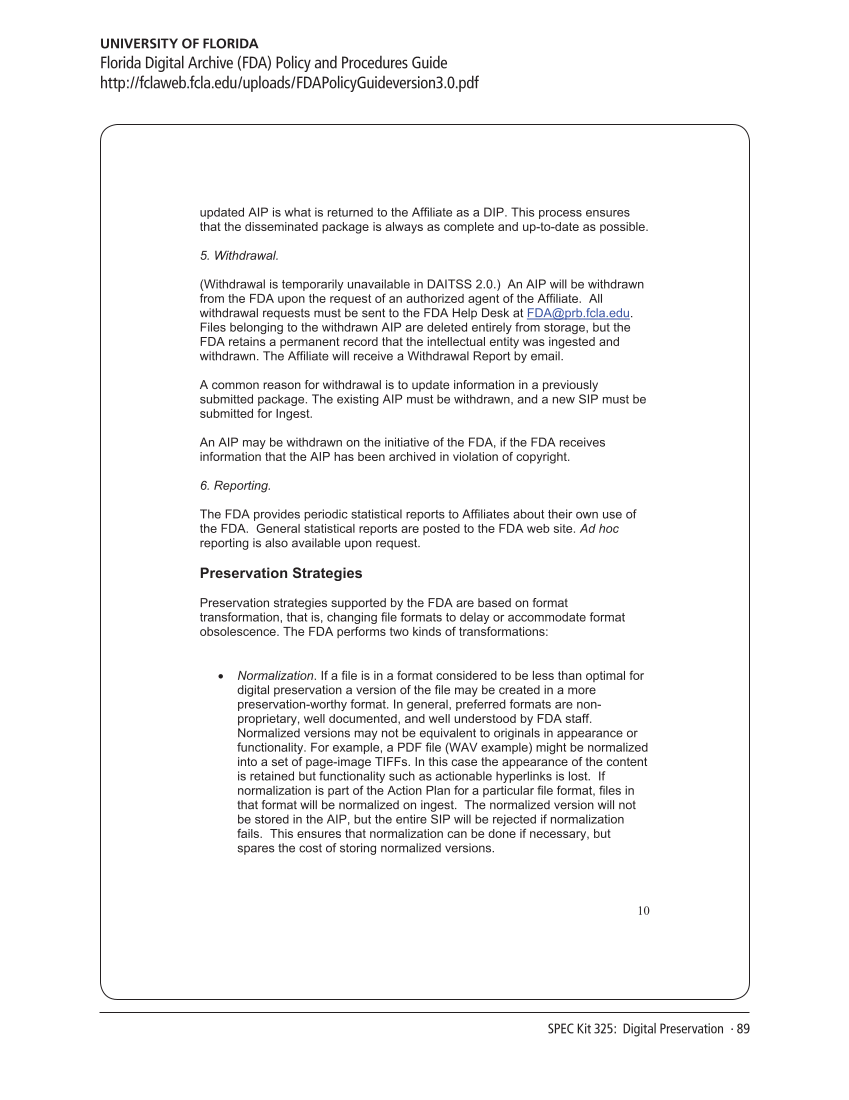SPEC Kit 325: Digital Preservation · 89
University of Florida
Florida Digital Archive (FDA) Policy and Procedures Guide
http://fclaweb.fcla.edu/uploads/FDAPolicyGuideversion3.0.pdf
updated AIP is what is returned to the Affiliate as a DIP. This process ensures
that the disseminated package is always as complete and up-to-date as possible.
5. Withdrawal.
(Withdrawal is temporarily unavailable in DAITSS 2.0.) An AIP will be withdrawn
from the FDA upon the request of an authorized agent of the Affiliate. All
withdrawal requests must be sent to the FDA Help Desk at FDA@prb.fcla.edu.
Files belonging to the withdrawn AIP are deleted entirely from storage, but the
FDA retains a permanent record that the intellectual entity was ingested and
withdrawn. The Affiliate will receive a Withdrawal Report by email.
A common reason for withdrawal is to update information in a previously
submitted package. The existing AIP must be withdrawn, and a new SIP must be
submitted for Ingest.
An AIP may be withdrawn on the initiative of the FDA, if the FDA receives
information that the AIP has been archived in violation of copyright.
6. Reporting.
The FDA provides periodic statistical reports to Affiliates about their own use of
the FDA. General statistical reports are posted to the FDA web site. Ad hoc
reporting is also available upon request.
Preservation Strategies
Preservation strategies supported by the FDA are based on format
transformation, that is, changing file formats to delay or accommodate format
obsolescence. The FDA performs two kinds of transformations:
• Normalization. If a file is in a format considered to be less than optimal for
digital preservation a version of the file may be created in a more
preservation-worthy format. In general, preferred formats are non-
proprietary, well documented, and well understood by FDA staff.
Normalized versions may not be equivalent to originals in appearance or
functionality. For example, a PDF file (WAV example) might be normalized
into a set of page-image TIFFs. In this case the appearance of the content
is retained but functionality such as actionable hyperlinks is lost. If
normalization is part of the Action Plan for a particular file format, files in
that format will be normalized on ingest. The normalized version will not
be stored in the AIP, but the entire SIP will be rejected if normalization
fails. This ensures that normalization can be done if necessary, but
spares the cost of storing normalized versions.
10
University of Florida
Florida Digital Archive (FDA) Policy and Procedures Guide
http://fclaweb.fcla.edu/uploads/FDAPolicyGuideversion3.0.pdf
updated AIP is what is returned to the Affiliate as a DIP. This process ensures
that the disseminated package is always as complete and up-to-date as possible.
5. Withdrawal.
(Withdrawal is temporarily unavailable in DAITSS 2.0.) An AIP will be withdrawn
from the FDA upon the request of an authorized agent of the Affiliate. All
withdrawal requests must be sent to the FDA Help Desk at FDA@prb.fcla.edu.
Files belonging to the withdrawn AIP are deleted entirely from storage, but the
FDA retains a permanent record that the intellectual entity was ingested and
withdrawn. The Affiliate will receive a Withdrawal Report by email.
A common reason for withdrawal is to update information in a previously
submitted package. The existing AIP must be withdrawn, and a new SIP must be
submitted for Ingest.
An AIP may be withdrawn on the initiative of the FDA, if the FDA receives
information that the AIP has been archived in violation of copyright.
6. Reporting.
The FDA provides periodic statistical reports to Affiliates about their own use of
the FDA. General statistical reports are posted to the FDA web site. Ad hoc
reporting is also available upon request.
Preservation Strategies
Preservation strategies supported by the FDA are based on format
transformation, that is, changing file formats to delay or accommodate format
obsolescence. The FDA performs two kinds of transformations:
• Normalization. If a file is in a format considered to be less than optimal for
digital preservation a version of the file may be created in a more
preservation-worthy format. In general, preferred formats are non-
proprietary, well documented, and well understood by FDA staff.
Normalized versions may not be equivalent to originals in appearance or
functionality. For example, a PDF file (WAV example) might be normalized
into a set of page-image TIFFs. In this case the appearance of the content
is retained but functionality such as actionable hyperlinks is lost. If
normalization is part of the Action Plan for a particular file format, files in
that format will be normalized on ingest. The normalized version will not
be stored in the AIP, but the entire SIP will be rejected if normalization
fails. This ensures that normalization can be done if necessary, but
spares the cost of storing normalized versions.
10






























































































































































